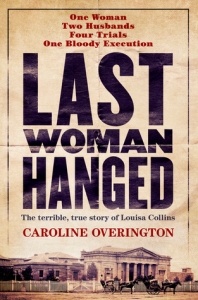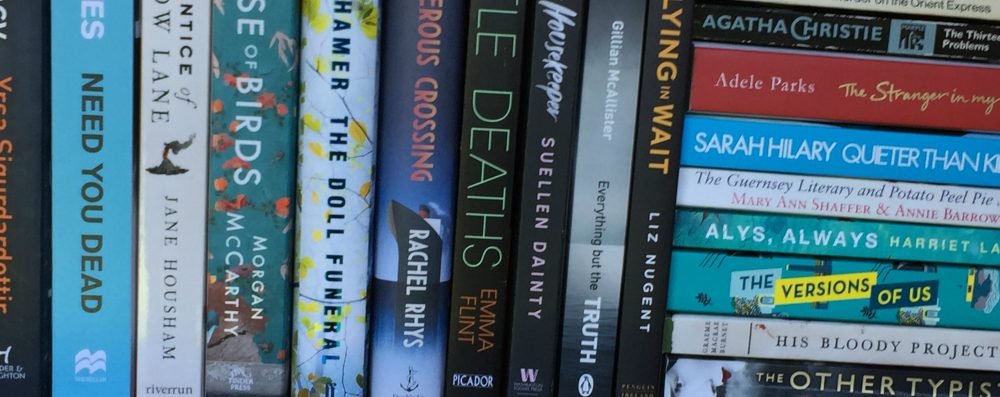
4*s
On 8 January 1889, Louisa Collins, a 41-year-old mother of ten children, became the first woman hanged at Darlinghurst Gaol and the last woman hanged in New South Wales.
Caroline Overington has researched the story behind Louisa Collin’s four, yes you read that correctly, four trials for murder. One of the three trials was in relation to the deaths of her first husband Charles Andrews in January 1887, the cause according to the doctor who signed his death certificate was Acute Gastritis, three were in relation to her second husband Michael Collins the man she married just three months after the demise of the first. Michael Collins died on 8 July 1888 of what the post mortem indicated was arsenic poisoning.
This book not only takes us through the suffering of both men as they writhed for days in agony with stomach pain but the job of the somewhat incompetent hangman – Nosey Bob, those who presided over the trials and most importantly the clamour of women’s voices to commute the death sentence passed when Louisa was finally declared guilty in respect of the death of Michael.
As with all these reconstructions of historical crimes one of the main questions is was Louisa guilty of the crime that meant ‘that she hanged from the neck until she was dead.’ It’s certainly far from clear cut, but that isn’t the main thrust of the book which is far more about women’s rights at a time they were treated as children. Louisa hanged on order of laws made by parliament of which she had no say in. She lived a life forever in the fear of abject poverty; if her husband didn’t work, she, and her children, wouldn’t eat and there was no way out of the never-ending cycle of child-birth, the last of Louisa’s babies had recently died when just a few months old.
Louisa isn’t the most sympathetic of characters, but once the death sentence had been passed those women who did have a voice, through their husbands and fathers, began clamouring for the sentence to be commuted. Although some of these were unconvinced of her guilt, by no means all were. There was after all the unpalatable truth that whilst thirty-six men had been unable to reach a consensus of guilt, Louisa was hung on the verdict of the final trial. Al of this carried out in the space of a few short months with a dwindling population of suitable jurors. Quite why there was so much will to retry this woman until the verdict of guilt was reached is unclear,but e can assume that powerful men were clearly determined that their presumption of guilt was the right one.
There is a fair amount regarding the politics of New South Wales at the time of the trials which to be honest meant little to me sitting as I do well over one hundred years later on the other side of the world, but they sound very similar to politics everywhere with the distinction that Australia was at this time trying to move away from being a penal colony to a fully-fledged independent country.
This was a fascinating read although at times I felt that I was bludgeoned by the repletion of information that this was a man’s world and Louisa had no say in the laws. I understand the argument but if Louisa did set about to murder two husbands in such an agonising fashion, she probably understood that if her crimes were discovered that the law was going to act. After all hanging wasn’t a rarity, although in New South Wales the last women prisoner had her sentence commuted.
The afterword takes us through the next few years where due to their vociferous campaigning Australian women were the first in the world to get the vote and spread the word to the rest of the world, including Britain. We also catch up with what happened to Louisa’s children and other key members of the case. A satisfactory ending to a book which gives a factual account of Louisa’s life and trials while bringing to the forefront a fight that would live long after her body had been cut down from the scaffold.
Last Woman Hanged is from my own collection of books, chosen not for the historical factor of this true crime but following my read of the author’s I Came to Say Goodbye which I thoroughly enjoyed.

this sounds like an amazing read..added to TBR
LikeLike
Excellent news – it is fascinating stuff, I do hope you enjoy it!
LikeLiked by 1 person
This sounds great! I’d be interested to read this one for the Australian history alone.
LikeLike
I found it totally fascinating as I know very little about Australia’s history and this period is particularly interesting.
LikeLike
Sounds fab!
LikeLike
It was 🙂
LikeLiked by 1 person
This really does sound fascinating, Cleo! I know what you mean about feeling almost bludgeoned with the author’s message; that can be irritating. But the story itself really has got my attention. And so does the setting.
LikeLike
I did find it absolutely fascinating Margot and it gave me a bit of an insight into Australia’s history which I confess I know little about. There is an awful lot of detail between the message.
LikeLiked by 1 person
This sounds great, so much broader than just the case it is examining.
LikeLike
Yes it had a lot about Australia’s history which was really interesting and of course even more about women getting the right to be allowed to vote made it much richer than one case.
LikeLiked by 1 person
I thought, from the title, this was about Ruth Ellis until I read the review. The book sounds like a great argument for divorce.
LikeLike
Indeed, and that was part of the problem if a divorce could be obtained the woman lost her children…
LikeLike
Sounds as though there was a lot of social condemnation that pushed the hanging.
LikeLike
This is very interesting and reminds me of the Florence Maybrick trial in Liverpool at about the same time, which I wrote a book about. There the accusation was also of arsenic poisoning but arsenic was used in those days as an aphrodisiac and her husband was a drug addict. There was the suggestion that Florence had soaked fly papers which contained arsenic to get a fluid to poison him with but she said she had done that to produce a face wash because she’d had an outbreak of spots. There were all kinds of elements that made the guilty verdict questionable including a mad judge and also the fact that Florence was known to have had an affair. Something that would have instantly condemned her in the eyes of the all male jury. She wasn’t hanged but spent a very long time in prison.
LikeLiked by 1 person
That sounds fascinating, Vicky – what is the name of the book?
LikeLike
I want to know too please? It sounds like it will go well with my collection of murderesses!
LikeLiked by 1 person
Thank you both very much for your interest. The book is published by the National Archives and called Mrs Maybrick. I also wrote another one on Ruth Ellis, incidentally the last woman to be hanged in Britain. I took the women because I was interested in the way women are treated differently by the criminal justice system and I was more interested in that than male serial killers. Both books are quite short 40,000 words but very nicely produced and are a good introduction to both cases. This is the link to the True Crime section of my blog with links to both books on Amazon. https://victoriablakewriter.wordpress.com/category/true-crime/
LikeLike
Thanks for that, Vicky – off to investigate… 🙂
LikeLike
I can imagine experiencing a wide range of emotions when reading this book…and while I like to have these feelings, I know that I will be frustrated, since it sounds like there is no good resolution. Thanks for sharing….
LikeLike
You are quite right Laurel, it is impossible to know the truth in this one…
LikeLike
Sounds like a great read, even if you did feel a bit bludgeoned. Yes, I’m not convinced not having the vote is really a good excuse to get off with pre-meditated murder – assuming she was guilty. There’s a big difference between killing a brutal husband with a knife in the heat of the moment and setting out to poison him somehow… but then, different times…
LikeLike
It is my pet hate in all types of book, repeating your main point once is enough – I don’t need to be reminded more often than that! As you can tell, I found the link a little weak and if she did it twice to two different husbands…
LikeLike
What a great review, this would be a great book club read with the right participants of course. I’m totally intrigued, I want to get back to reading true crime.
LikeLike
You are right there is certainly much to discuss, not least whether Louisa was guilty or not and the rights and wrongs of other aspects which I didn’t include so as not to spoil the book for those who might want to read it – and then there is the support of the women of NSW and wider Australia.
LikeLike
Sounds like an interesting book. It does seem like some of the info/thoughts of the author could be repetitive, but I also found it fascinating that they tried her FOUR times just to basically get a guilty verdict.
lauren
http://www.shootingstarsmag.blogspot.com
LikeLike
Those four trials are shocking and that part as much as anything gave me some sympathy for Louisa…
LikeLike
Cleopatra & Fiction fan: It looks like MRS MAYBRICK by Victoria Blake. It’s also covered in Victorian Murderesses (which I thought was fantastic) by Mary S. Hartman
LikeLike
Hi Guy – thank you. I have actually found (and ordered) Mrs Maybrick as I did enjoy Victorian Murderesses which was the first time I’d heard of this particular lady. I’m now keen to read more about her from another perspective
LikeLike
Does sound like an interesting read Cleo.
LikeLiked by 1 person
This sounds very intriguing!
LikeLike
Reblogged this on The Darkness in the Light.
LikeLike